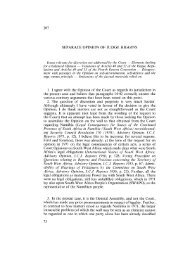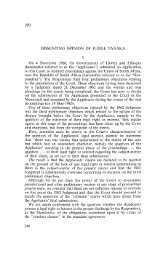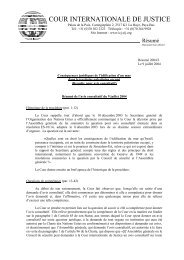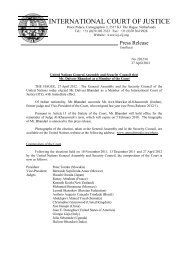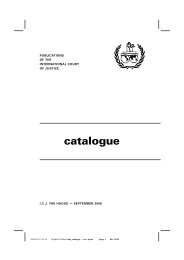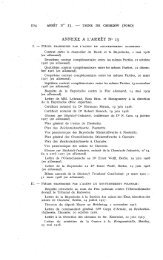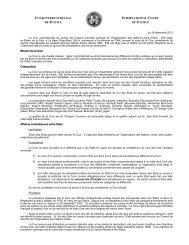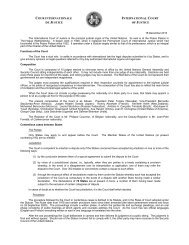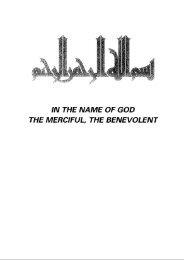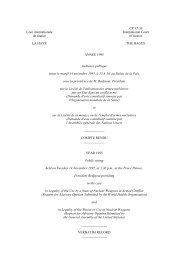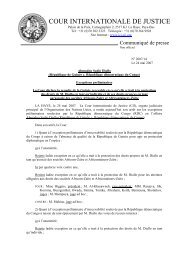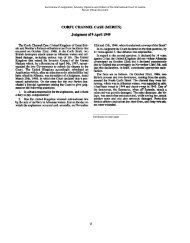botswana/namibia - Cour international de Justice
botswana/namibia - Cour international de Justice
botswana/namibia - Cour international de Justice
You also want an ePaper? Increase the reach of your titles
YUMPU automatically turns print PDFs into web optimized ePapers that Google loves.
213. Thus the South African letter dated 26 April 1992 involved a change in position after<br />
nearly 44 years. The text is as follows:<br />
"I refer to your letter of 19 March 1992 and must inform you that the Republic of South<br />
Africa has at no time "given encouragement to and acquiesced in Botswana's claim to Sidudu<br />
island.<br />
The joint survey you refer to in your letter, a copy of which I attach, did come to certain<br />
conclusions, but according to legal opinion in South Africa at that time, did not prove<br />
conclusively that Sidudu island belongs to Botswana. The South African authorities have<br />
therefore suggested to Botswana in a telex dated 17 November 1986 that the matter be taken<br />
up with the Government of an in<strong>de</strong>pen<strong>de</strong>nt Namibia. This was not acceptable to Botswana as<br />
they consi<strong>de</strong>red the joint survey's report to be conclusive and in fact expressed the opinion<br />
that 'no further discussion of the matter is necessary'.<br />
The matter has therefore not been resolved as South Africa has never officially recognized<br />
Botswana's claim to Sidudu island.<br />
I trust that the aforementioned will put matters into perspective and would assist you in your<br />
negotiations with the Botswana Government." (Mr. R.F. Botha to Mr. Theo-Ben Gurirab,<br />
Namibian Memorial, Annex 88).<br />
214. This document is less than frank about a number of matters. It fails to do justice to the<br />
historical record and it ignores the existence of the Pretoria Agreement of 19 December 1984.<br />
(E) The Namibian View of the Object and Purpose of the Anglo-German Agreement<br />
215. The Namibian Memorial (pp.31-2) examines the object and purpose of the Anglo-<br />
German Agreement and conclu<strong>de</strong>s:<br />
"The negotiators were not concerned with the allocation of small areas, but with a<br />
comprehensive 'African transaction'. At the large scale on which they were thinking, the<br />
important objective was the i<strong>de</strong>ntification of a recognizable boundary. This was achieved by<br />
the selection where possible of a geographical line that appeared clearly on the available<br />
relatively small-scale maps, in the present case, the line of the Chobe. Their common interest<br />
was in the stability and certainty of the boundary. In principle, the parties must have wished to<br />
agree upon a fixed and readily i<strong>de</strong>ntifiable boundary, rather than one that for about five<br />
months of the year would be invisible or obscure. For this reason, the selection of the line of<br />
the northern channel rather than the line of the southern channel would have been inconsistent<br />
with the basic object and purpose of the Treaty."<br />
216. The Government of Botswana agrees that 'the important objective was the i<strong>de</strong>ntification<br />
of a recognizable boundary', and also that the parties to such an agreement have a 'common<br />
interest in the stability and certainty of the boundary.' It is not at all persua<strong>de</strong>d that in<br />
diplomatic practice, or in terms of public <strong>international</strong> law, it is accepted that the prospect of<br />
seasonal flooding would be recognised as the justification for <strong>de</strong>parting from the <strong>de</strong>finition of<br />
the boundary as provi<strong>de</strong>d in the text of the agreement.<br />
217. It is surely eccentric to seek a 'recognizable' or 'readily i<strong>de</strong>ntifiable' boundary in the<br />
vagaries of flood zones and 'overlying channels'. The strange result of this approach can be



